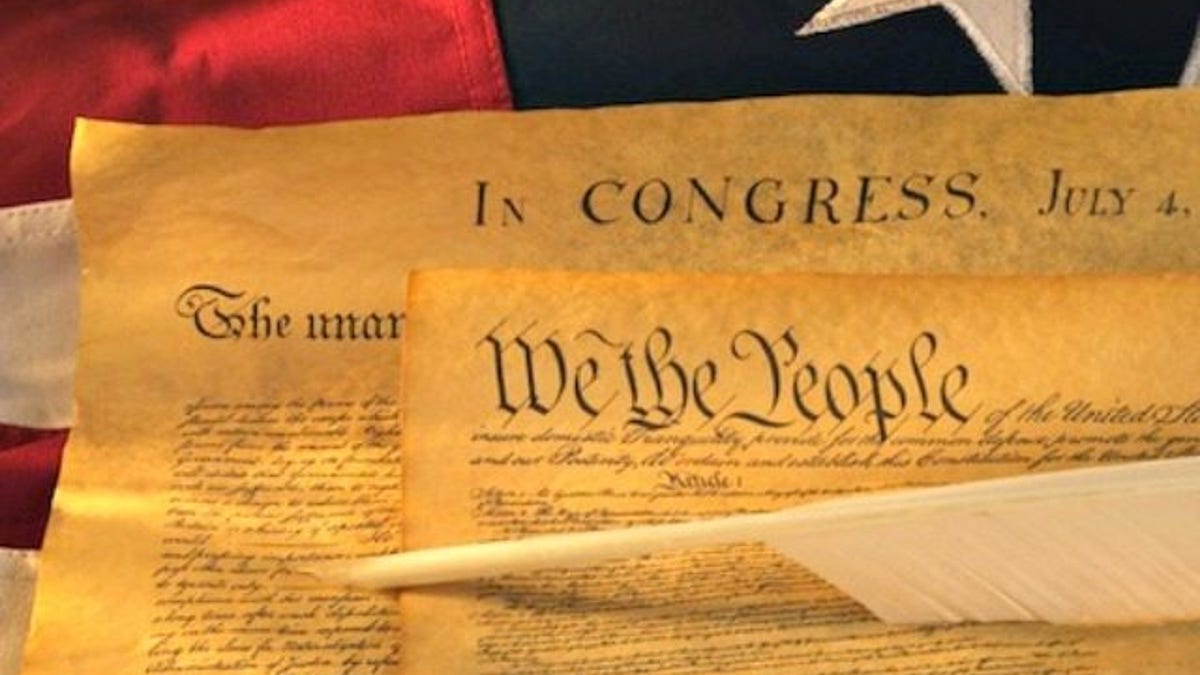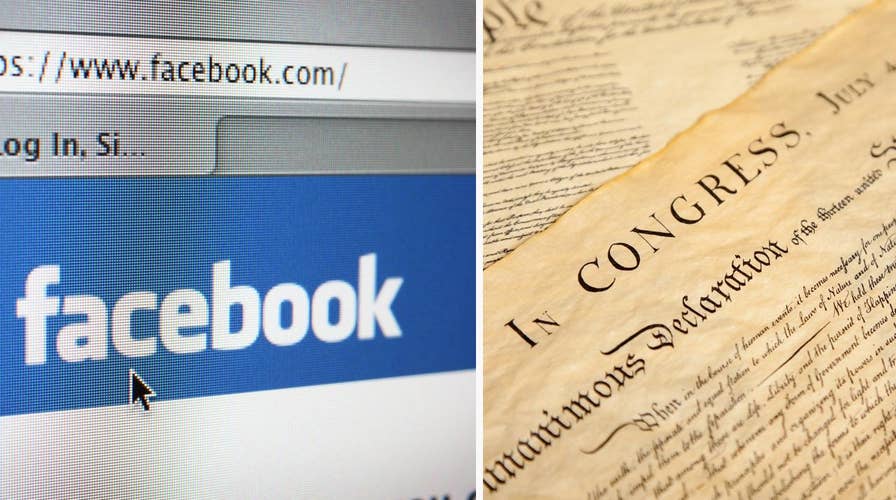Facebook labels Declaration of Independence as hate speech
Facebook has removed a post from Texas newspaper The Liberty County Vindicator that featured excerpts from the Declaration of Independence. Facebook's reason: the Declaration of Independence contained 'hate speech.'
Facebook is sorry—for many, many things.
The embattled social network, which has found itself facing government scrutiny, strict new regulations in Europe, criticism from politicians and now, a plummeting stock price, has been apologizing so often that it’s difficult to know which mea culpas are most pertinent.
Fox News has compiled a small sample of the incidents that prompted CEO Mark Zuckerberg or his colleagues to apologize.
FACEBOOK SLAMMED BY SANDY HOOK PARENTS OVER LIES, HOAX CLAIMS
Cambridge Analytica data scandal
Zuckerberg’s company took out full-page advertisements in U.S. and British newspapers in March to apologize for the “breach of trust” that permitted the now-defunct political consultancy Cambridge Analytica—which did work for the 2016 campaign of President Donald Trump and others—to improperly harvest the data of at least 87 million users.
The billionaire’s apology tour included testimony before lawmakers in both countries.
Russia's U.S. election interference
In November 2016, Zuckerberg called the notion that fake news impacted the U.S. presidential election a “pretty crazy idea.” However, a federal grand jury indicted 13 Russians and three Russian companies for allegedly meddling in the presidential election—specifically calling out their usage of Facebook to sow discord and influence U.S. public opinion.
Since then, the tech giant has gone on a hiring spree, partnered with nonpartisan fact-checkers, removed hundreds of accounts or pages and made the eradication of fake news and the protection of election integrity a bigger priority. COO Sheryl Sandberg told Axios that Facebook owes the American people “Not just an apology, but determination for our role in enabling Russian interference during the election.”
FACEBOOK'S MARK ZUCKERBERG LOSES $16B IN ONE DAY

(AP)
‘Hate Speech’ in the Declaration of Independence
Facebook sent a note to the Liberty County Vindicator in Texas, which had been posting excerpts of the document, saying this passage violates its standards on hate speech: "He has excited domestic insurrections against us, and has endeavoured to bring on the inhabitants of our frontiers, the merciless Indian Savages, whose known rule of warfare, is an undistinguished destruction of all ages, sexes and conditions.”
The newspaper, which surmised that the phrase “Indian savages” may have triggered the tech company’s algorithms, received a notice saying Facebook was “sorry” for removing the post and that the content had been restored.
Allowing underage users, extreme content
A recent Channel 4 undercover investigation in the U.K. found that Facebook knowingly permitted extreme content and allowed underage users to remain on the platform. In addition, one of the company’s earliest investors says that extreme content is Facebook’s money-making “crack-cocaine.”
Facebook Vice President of Global Policy Richard Allan says in the Channel 4 documentary: “You’ve identified some areas where we’ve failed, and I’m here today to apologize for those failings.”
STUDY REVEALS WHAT TYPES OF PEOPLE ARE FLEEING FACEBOOK
Censoring Wes Cook Band’s ‘I Stand for the Flag’
In early July, the tech platform prevented the Wes Cook Band from using its advertising tools to promote their song “I Stand for the Flag” due to its “political content.” The song features lyrics such as: “Don't care if you're black or white or who you love, I stand for the Flag and the Flag stands for all of us.”
After a dialogue with the band—which says the song is about patriotism and unity—Facebook reversed course and said: “We’ve spoken to the Wes Cook band to explain we made an error here,” it explained in a joint statement. “We’re grateful for their patience as we work to improve our policies.”
Search suggestions of child pornography videos
British users in March said the social media company’s suggestions, which are supposedly the result of popular search terms as determined by an algorithm, started to suggest unpleasant results to users who typed in "video of."
After users took to Twitter to complain of suggestions that included child pornography and other bizarre content, Facebook issued a statement saying that they removed the "offensive predictions" as soon as they became aware of them.
Holocaust denier comments
The company's battle against fake news hit a snag when Zuckerberg said the platform would not ban Holocaust deniers, saying to Recode that his company should not "be in the business of having people...who are deciding what is true and what isn’t."
After mounting criticism, in particular from Jewish users, Zuckerberg clarified his comments by saying: "I personally find Holocaust denial deeply offensive, and I absolutely didn’t intend to defend the intent of people who deny that." He added that Facebook would remove posts that "cross a line" into advocating for violence against particular groups.
Rejecting ads from restaurants, hair salons as 'political'
The technology giant, which instituted more stringent rules that force anyone running political ads on the platform to reveal their identity and location, was called out for mistakenly rejecting ads from businesses that were not political.
“Enforcement is never perfect at launch, but that's why we have processes in place for people and advertisers to help us improve. Advertisers can appeal their ads that are in the archive but shouldn't be there,” Rob Leathern, Director of Product Management at Facebook, told Fox News.
Censoring Diamond & Silk
The pro-Trump social media personalities claimed several times that their posts were censored or downplayed on Facebook. Several of the duo's videos were tagged as "unsafe for the community."
However, Monika Bickert, head of Global Policy Management at Facebook, told House lawmakers that the platform "badly mishandled" their communications with Diamond & Silk.
Removing a photograph of two men kissing
Instagram, which is owned by Facebook, removed a photograph of two men kissing that was taken by U.K.-based photographer Stella Asia Consonni for a magazine project for violating community guidelines.
The post, which a source told Fox News was removed due to human error, was reinstated and a spokesperson said it was taken down "by mistake."
Fox News’ James Rogers contributed to this report.























